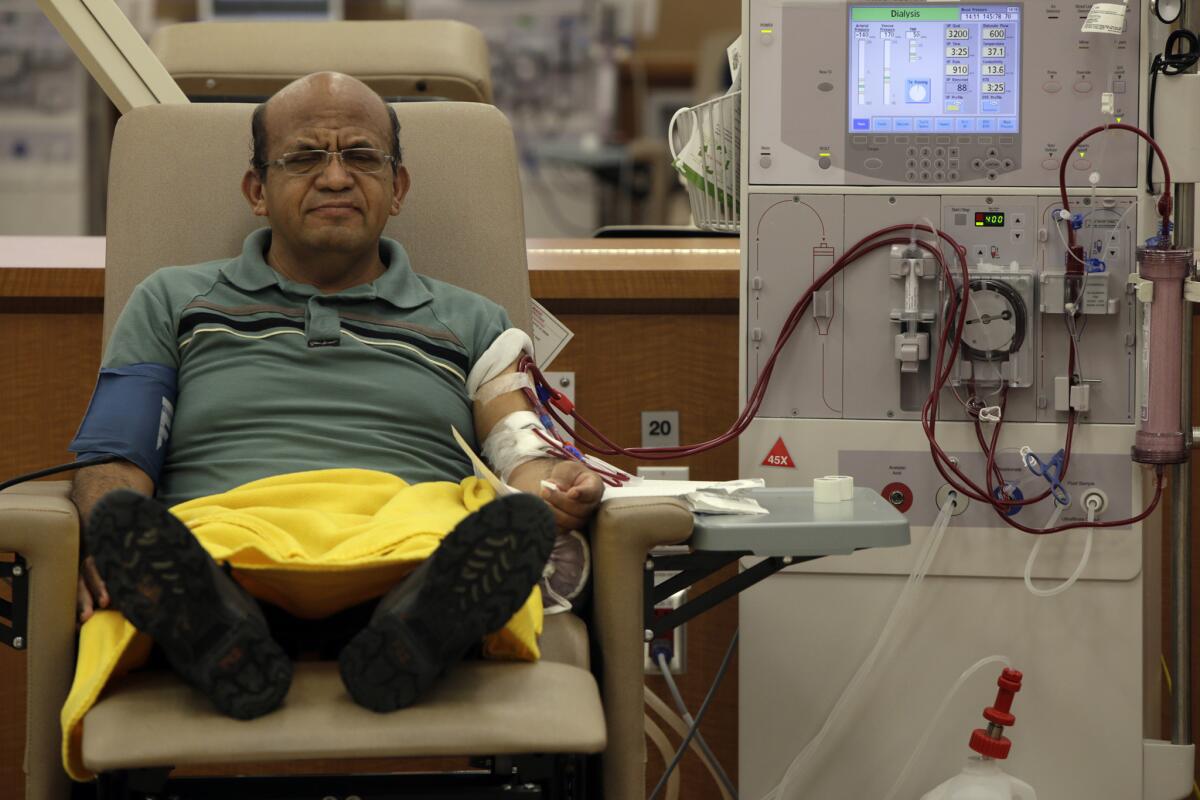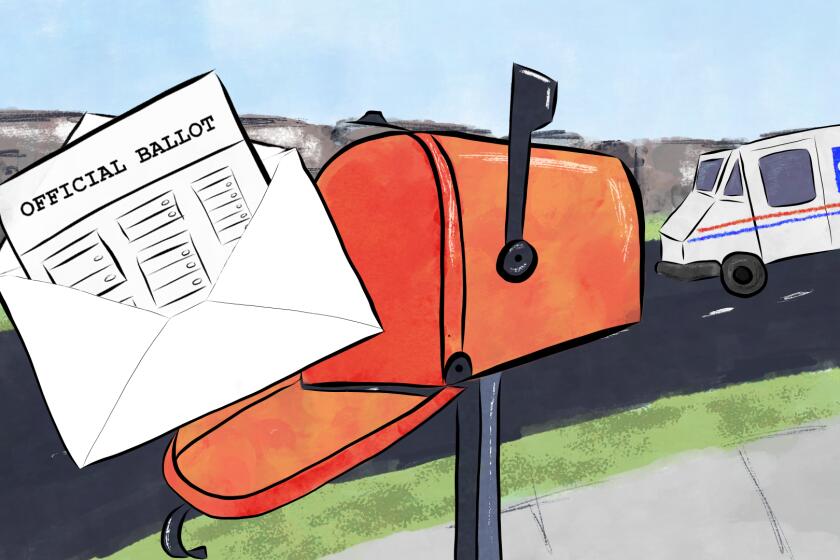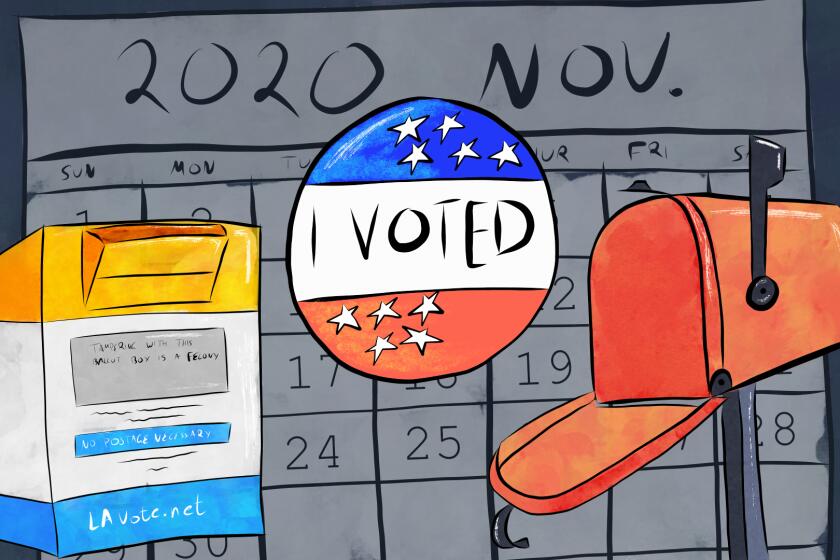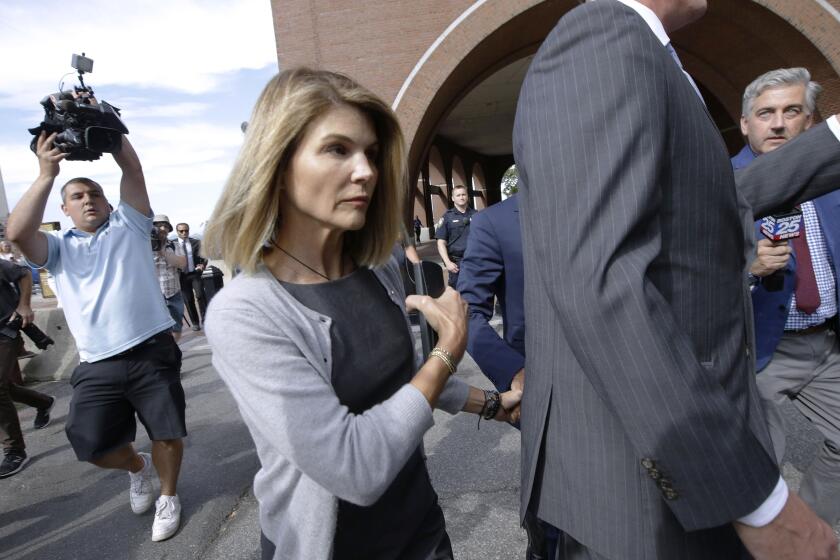California voters will again consider new dialysis center regulations with Prop. 23

SACRAMENTO — California voters will again weigh in on a costly ballot-box fight between a healthcare union and the dialysis industry, with both sides saying the care of 80,000 people will be affected by Proposition 23.
The measure would require dialysis clinics to employ at least one doctor who is on-site whenever patients are receiving treatment. Backers of the proposition, the Service Employees International Union-United Healthcare Workers West, say dialysis clinics are favoring profits over patient care by not having a doctor available in the event of complications or an emergency.
The dialysis industry has put more than $100 million into fighting the measure, arguing that doctors’ and nurses’ associations agree that Proposition 23 is unnecessary and that the added cost would lead to dialysis clinics closing, which would put patients at even greater risk.
There are roughly 600 dialysis clinics in California, each treating thousands of residents suffering from kidney failure with machines that remove a patient’s blood and filter it to remove waste and excess fluids before returning the blood to their body. Patients would die without dialysis, which requires a session of about four hours three days a week. Because of the high demand for dialysis, clinic operators say they are typically open six days a week for up to 16 hours a day.
“I’m all for anything that improves care for patients,” said Dr. Edgard Vera, a kidney specialist who works at hospitals in the high desert cities of Victorville and Apple Valley. “But having a full-time doctor there doesn’t do that.”
The measure comes amid a national shortage of physicians, with a June report by the Assn. of American Medical Colleges projecting that the United States will be short 54,100 to 139,000 physicians by 2033. Like other states, California’s doctor shortage is growing as the state’s residents are growing older, with an aging baby boomer population increasing the need for healthcare workers.
Opponents say the measure will exacerbate the doctor shortage and that there are already a sufficient number of medical staff required at dialysis clinics. Federal regulations mandate that each clinic has a medical director who is a board-certified physician, but that person is not required to be on-site at all times. Federal and state laws also require clinics to have a nurse manager, dietitian, social worker and registered nurse on staff.
Proponents of Proposition 23 say they have accounted for concerns over doctor shortages by allowing clinics to hire a doctor of any speciality, not just nephrologists, who specialize in diseases and conditions affecting the kidneys. Under Proposition 23, clinics that are unable to hire a doctor due to a shortage of physicians could apply for a waiver from the California Department of Public Health in order to instead hire a nurse practitioner or physician’s assistant for a year.
“Anytime someone tries to regulate this industry, they say clinics will close and patients will die,” said Steve Trossman, a spokesman for SEIU-UHW. “It’s an attempt to put fear in people. They are making too much money off these clinics to walk away.”
The independent legislative analyst’s office has estimated that dialysis clinics in the state have total revenues of more than $3 billion annually. Nearly three-quarters of dialysis centers in California are owned or operated by two companies — DaVita Inc. and Fresenius Medical Care.
The dialysis industry and the healthcare union have been locked in a years-long fight, which resulted in SEIU-UHW pushing Proposition 8 in 2018. That measure would have required business with revenues exceeding 115% to provide rebates to insurers and pay a penalty to the state. A coalition led by DaVita and Fresenius Medical Care spent a record-setting $111 million in 2018 to blanket the airwaves with opposition ads and successfully defeated the measure.
This year, opponents have so far raised $105.2 million to fight Proposition 23, according to a Times analysis of campaign contributions. Of that amount, DaVita has contributed $66.8 million.
“It’s obscene how much they are spending,” Trossman said. “We obviously can’t keep up with that kind of spending.”
Proponents have so far raised $6.9 million for Proposition 23, with almost all of it coming from SEIU-UHW.
Opponents argue SEIU-UHW has been weaponizing the ballot measure process to force the dialysis industry to spend heavily to defend itself when the union’s real interest is getting workers in clinics to unionize.
“UHW is using Prop. 23 to advance its union-organizing agenda, nothing else,” said Kathy Fairbanks, a spokeswoman for the opposition campaign. “Patients don’t want to be in the middle of this political fight, especially since their lives are the ones at risk.”
The union has tried to unionize dialysis workers, but SEIU-UHW alleged in 2017 that DaVita was retaliating against employees who supported forming a union. SEIU-UHW has previously turned to the ballot following labor disputes, including one with the California Hospital Assn.
Trossman denied that adding new members was the motive for Proposition 23.
“They are trying to impugn our motives,” Trossman said. “We have members on dialysis, members with family on dialysis. We have a strong interest in seeing this industry improve and trying to get dialysis corporations to act respectably and responsibly toward patients.”
Proposition 23 would require clinics to report dialysis infection information to the California Department of Public Health every three months, which would then be posted on the state agency’s website. Clinics could face a fine of up to $100,000 for failing to report the data or reporting inaccurate information.
Clinics are currently required to report dialysis-infection-related information to the U.S. Centers for Disease Control and Prevention.
The measure would also require clinics to obtain approval from the state’s public health department before closing or substantially reducing services. And it would bar clinics from refusing access to a patient based on their insurance.
A majority of people on dialysis in California are covered by Medicare, which extends coverage to people with kidney failure regardless of age or disability status.
Rick Barnett, president of Satellite Healthcare, which operates more than 60 nonprofit dialysis clinics in California, questioned the legality of requiring clinics to obtain approval to close and said discrimination based on insurance wasn’t an issue since nearly all patients had Medicare.
“So I have to ask, what is the problem this ballot measure is actually trying to solve?” Barnett said.
Robert Villanueva, who receives dialysis in Montebello, said the ballot measure would provide him peace of mind while receiving treatment. Villanueva, a 62-year-old Realtor, said he had lost consciousness while undergoing dialysis and had to be taken to an emergency room. He said dialysis centers could afford to hire full-time doctors so that patients, many of whom have significant additional health issues, could receive immediate attention when needed.
“There are too many situations where patients are wheeled off to emergency rooms,” Villanueva said. “It makes you think, why isn’t there a doctor here looking after me?”
Times staff writer Maloy Moore contributed to this report.















